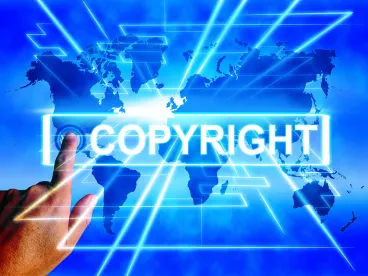The U.S. Supreme Court recently issued two decisions addressing the status of state governments as both a putative author and owner of a copyrightable work and an alleged infringer. In Allen v. Cooper, decided March 23, 2020, the Court unanimously held that states retain their sovereign immunity against copyright infringement suits, despite a provision of the Copyright Act designed to abrogate such immunity. In Georgia v. Public.Resource.Org, Inc., decided April 27, 2020, the Court held that the annotations in Georgia’s official code were not subject to copyright protection under the government edicts doctrine.
Allen: States Are Immune from Claims of Copyright Infringement Through Sovereign Immunity
In 1996, a private company discovered the wreckage of a ship commandeered by Blackbeard, the infamous pirate, off the cost of North Carolina. The state of North Carolina, which became the owner of the wreck, hired the company to salvage the ship; the company then hired a videographer, Frederick Allen, to capture its activities. Mr. Allen copyrighted the images and videos he created. Several years later, the state posted five of the videos online and printed a photograph in a newsletter. Allen sued North Carolina in federal court for copyright infringement. North Carolina argued that, under the doctrine of sovereign immunity, it could not be liable for copyright infringement. Allen argued that the Copyright Remedy Clarification Act of 1990 (CRCA) abrogated states’ sovereign immunity, and therefore North Carolina could be held liable.
The CRCA specifically provides that states “shall not be immune, under the Eleventh Amendment of the Constitution of the United States or under any other doctrine of sovereign immunity” from copyright infringement lawsuits. 17 U.S.C. § 511(a). Nonetheless, the Supreme Court affirmed the Fourth Circuit’s ruling that Congress’ attempt to revoke state sovereign immunity was invalid, because it is unconstitutional.
Specifically, under governing precedent, there are two requirements that must be met before a federal court can hear a lawsuit against a non-consenting state. First, according to the Court, “Congress must have enacted ‘unequivocal statutory language’ abrogating the States’ immunity from the suit.’” Second, “some constitutional provision must allow Congress to have thus encroached on the States’ sovereignty.” While the CRCA easily met the first of these requirements, the Court held that it failed to meet the second. In rejecting Allen’s arguments to the contrary, the Court relied heavily on Florida Prepaid Postsecondary Ed. Expense Bd. v. College Savings Bank (527 U.S. 627 (1999)), in which the Court held that the Patent Remedy Act did not validly abrogate the states’ sovereign immunity with respect to patent infringement suits. In particular, the Court held that under Florida Prepaid and the doctrine of stare decisis, the authority to abrogate the states’ sovereign immunity could not be found in the Intellectual Property Clause of Article I of the Constitution. Moreover, after reviewing the legislative history of the CRCA, the Court held that the CRCA did not validly abrogate state sovereign immunity under Section 5 of the Fourteenth Amendment, because it lacked the necessary congruence and proportionality between constitutional injury to be prevented or remedied and the statutory means adopted; in particular, the CRCA applied to both negligent and intentional infringement, and Congress did not consider whether a state law remedy for the alleged infringement was available. In this way, the CRCA suffered from the same deficiencies that doomed the Patent Remedy Act in Florida Prepaid.
Public.Resource.Org: Annotations to State Code Are Not Copyrightable
Public.Resource.Org addresses the copyright protection afforded to the Official Code of Georgia Annotated (OCGA), which comprises, among other things, a set of annotations appearing below each statutory provision that summarize relevant judicial decisions, attorney general opinions, and other reference materials related to that provision. Georgia’s Code Revision Commission, an arm of the state legislature, commissioned Matthew Bender & Co. (a division of LexisNexis) to prepare the annotations under a work-for-hire agreement vesting copyright in the state of Georgia. Public.Resource.Org, a nonprofit organization with a mission to make government materials accessible to the public, put the entire code – including annotations – online. Georgia sued for copyright infringement, arguing that while the laws themselves were in the public domain, the commissioned annotations were not.
The Supreme Court, affirming the Eleventh Circuit by a 5-4 majority, held that the annotations were not copyrightable. Relying on three nineteenth-century cases involving the copyright status of judicial opinions,1 the Court held that the “government edicts doctrine” precludes copyright in the annotations because they were authored by an arm of the legislature in the course of its official duties – just as judicial opinions cannot be subject to copyright because they were authored by judges in the course of their judicial duties. Importantly, the annotations were ineligible for copyright even though they did not have the force of law. Moreover, the majority additionally noted that the annotations, while non-binding, provide important practical guidance, which would otherwise only be available to those who can afford or are able to access the official annotated version.
Potential Impact of the Allen and Public.Resource.Org Decisions
Allen and Public.Resource.Org alter the relationship between the states and the federal copyright scheme in subtle but important ways. More significantly, these two decisions also may impact the relationship between states and their citizens — especially those that want to enter into contracts or other commercial relationships with them.
The holding of Allen is simple and potentially limited: States cannot be haled into federal court for alleged copyright violations without their consent. In its opinion, the Supreme Court opened the door for Congress to correct the constitutional infirmities of the CRCA by enacting narrowly tailored legislation aimed at combating due process violations and building an appropriate legislative record. Moreover, nothing in Allen prevents sovereign states from consenting to suit or from being sued in state court. As a result of this case, creators of copyrightable works may insist on contractual safeguards against misappropriation of their intellectual property (for instance, a contractual waiver of sovereign immunity), or at least on increased compensation to account for the potential for states to use their works beyond what the author may have contemplated.
Public.Resource.Org also provides a relatively simple rule: Works created by legislators in the scope of their official duties cannot be copyrighted. This rule affects not just Georgia, but apparently 25 states and other U.S. jurisdictions that have similar arrangements to produce annotated versions of their laws. However, the Court’s holding that the annotations at issue were authored by the Georgia legislature was based, in large part, on the fact that the Code Revision Commission was the “author” of a work made for hire, due to its contractual relationship with Matthew Bender. If states are intent on maintaining copyright protection over their annotated codes, they may consider structuring their relationships such that private companies (like Matthew Bender) would be deemed the authors of those annotations, and would assign or license those annotations to the states. While the ability of the states to control the dissemination of those codes may be challenged on other grounds,2 such a restructured relationship may potentially mitigate the direct effect of the Supreme Court’s latest pronouncement.
1 Wheaton v. Peters, 8 Pet. 591 (1834); Banks v. Manchester, 128 U. S. 244 (1888); Callaghan v. Myers, 128 U. S. 617 (1888).
2 See, e.g., 17 U.S.C. § 107 (governing the fair use of copyrighted materials); Veeck v. S. Bldg. Code Cong. Int’l, Inc., 293 F.3d 791 (5th Cir. 2002) (en banc) (holding defendant not liable for infringement for copying a privately-authored model code, which was adopted as “the law” of a number of municipalities).



 />i
/>i

